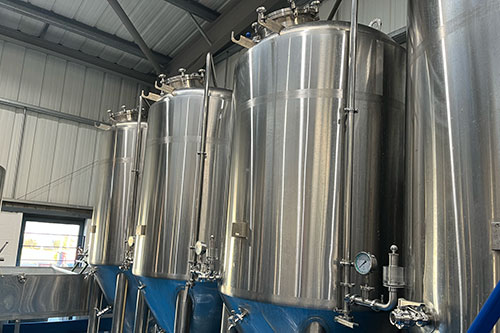Monday January 30th 2023

The Otherworld Brewery in Hardengreen, Midlothian.
This View has been written Theo Barnes, a brewer at Midlothian’s Otherworld Brewery in Hardengreen.
The Deposit Return Scheme, DRS, is fast approaching introduction by the Scottish government. There is next to no public awareness of how badly this would affect Scottish business, the Scottish and UK economy, and the general public.
The craft beer industry supports a working DRS, we want to be part of a sustainable future with a circular recycling economy. The SNP and Green government has not produced a working DRS scheme, it is anti-business and will eliminate the diverse economic environment in Scotland.
How does it work? A customer buys a can or bottle of, for my sake beer, where they pay a 20p deposit. You drink it and eventually return it to a proposed automatic recycling machine or a return point in a place like a supermarket. Seems fine? That’s where it ends.
For the business that made that beer, first they will need to register with SEPA and Circularity Scotland, CS, the company the Scottish government will be using to make their scheme work. First comes a flat fee with participation in the scheme of £360.
Whether you produce billions of litres a year like Tennents, or produce 35,500 litres like I did last year, you pay the same. This is one of many anti-competitive problems. Big businesses absorbs non consequential costs, tiny competitors will be disproportionately affected.
Next is another cost, each producer pays a 20p deposit on every can prior to the customer also paying that deposit. Say we make 10,000 cans of beer, we will have to pay £2,000. We could get the money back when the can is marked as recycled by CS (unclear if this is VAT inc).
But this will take money out of the business for months causing major cashflow problems to small producers who work on a knife edge that large businesses do not. Small businesses here are acting as part of a guarantor, a bank to finance the scheme and it will crush them.
A producer fee per container is also added to this cost. This is probably going to be variable around the type of container to cover handling and recycling costs, so we’ll pay for that too. An extra actual cost to the finances of each business.
Loss of diversity. Each product will need to be registered with their unique barcode SKU 6 weeks before going to market. This lead time does not exist for businesses that develop exciting new beers each time. Special releases, flexibility in design or description. All gone.
Fine if you have a core range of a handful of products like macro breweries. Many smaller craft beer producers do not operate to a core range model, we thrive on creative space to change and adjust each unique beer to the point of release which this plan does not accommodate.
Fines. If your product does not reach a recycled amount, I believe 80%, a fine is due. I’ve heard CS are the ones picking this up. Its vague. Another risk that if fines are passed on big business will be able to afford this, while small businesses will be eaten up.
Have you ever stored a bottle away for ageing or drinking later. Ever broken a bottle or peeled off a can label which has the identifying barcode on it. Have you ever not recycled something because convenience wasn’t worth the cost of 20p.
Have you ever given a bottle to a friend not in Scotland? These are the things that take our barcodes out of the system and almost guarantee fines. We are accountable for every gram of aluminium or glass that leaves the brewery. Our liability is then in the consumer’s hands.
The UK single market! The scheme will create an economic border between Scotland and rUK. So it will become another creeping constitutional crisis.
Scottish producers will need to make products that differ in barcode or label for sale in rUK or Scotland. rUK producers will need to do the same for sale into Scotland and also register to sell and be liable to the fines. The frictionless flow of products will be hindered.
Consumer choice. Some Scottish breweries are considering either not selling in Scotland at all and just ‘exporting’ to rUK because losing a local economy is better than dealing on the terms of this scheme and it’s risks. The local economy is also better for carbon footprint.
Businesses outside Scotland from all over the world will not be thinking about signing up for this risk. Shops that deal in a range of craft or artisanal products you could lose their range. You will be left with supermarket range, and a reduced range in that too.
I love a Tennents, but the UK had this in the 70s after macro brewery consolidations. The choice of product gets very thin very fast. A less diverse economy, monopolisation, and macros battling it out to scrape the bottom of value. Leaves no choice for the consumer.
Engagement and communication are needed from the SNP Green government. The success story of the last 15 years craft beer industry is one of many voices that have been shouting about these problems and it has been hit with silence. Vagaries are inbuilt. Overhaul is needed.
Scottish Labour this is an opportunity to show your pro-business, economic and green competence, and constitutional clarity. Please take a stand on this issue. Working DRS schemes exist all over the world. One of them please. This will absolutely shatter the Scottish economy.
Oh, probably say goodbye to bottles. The recycling will be done by weight and you can get volumes more cans crushed and dispatched so bottles will be more challenging.
These points only scratch the surface of the volumes of problems to come.
Tweet Share on Facebook